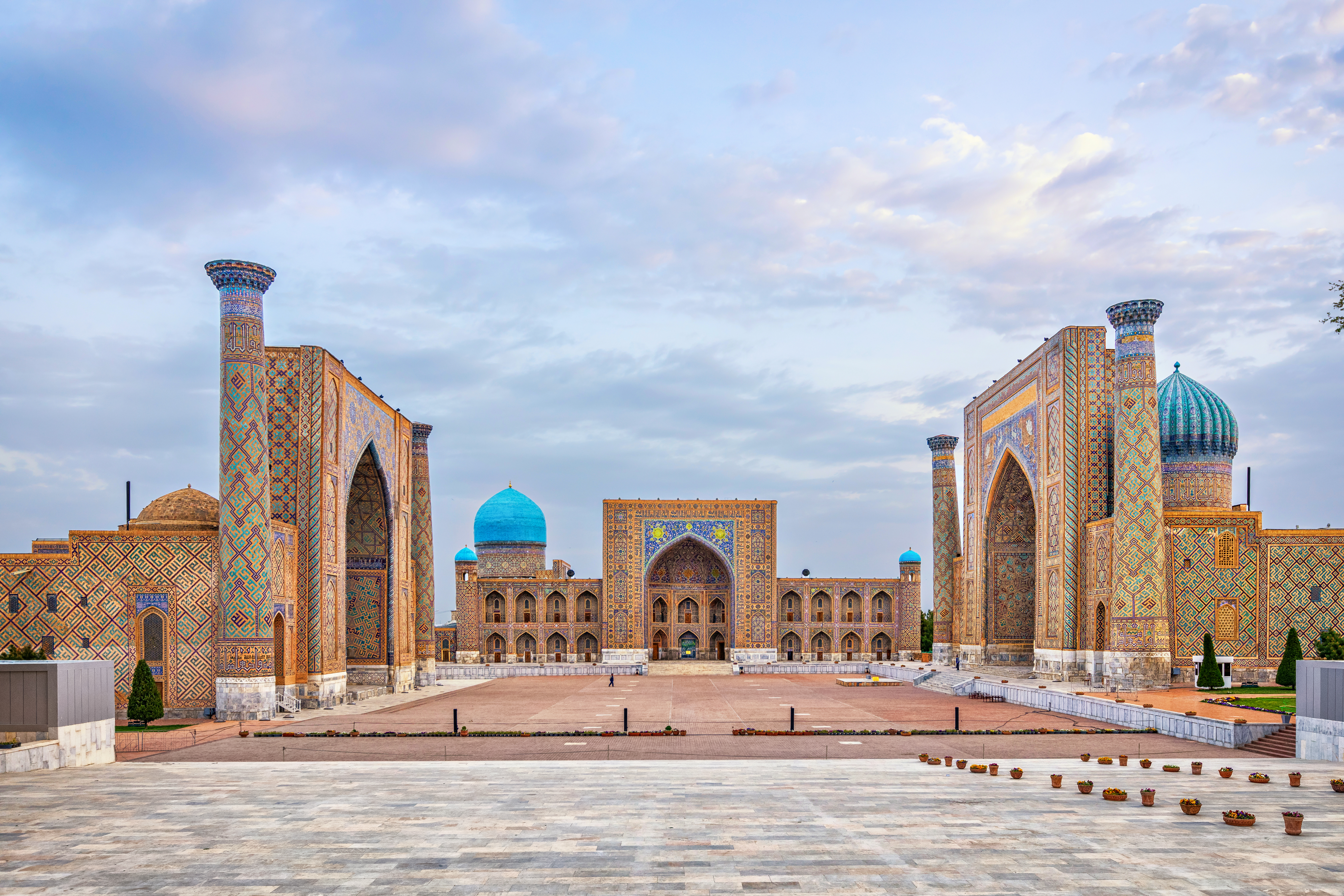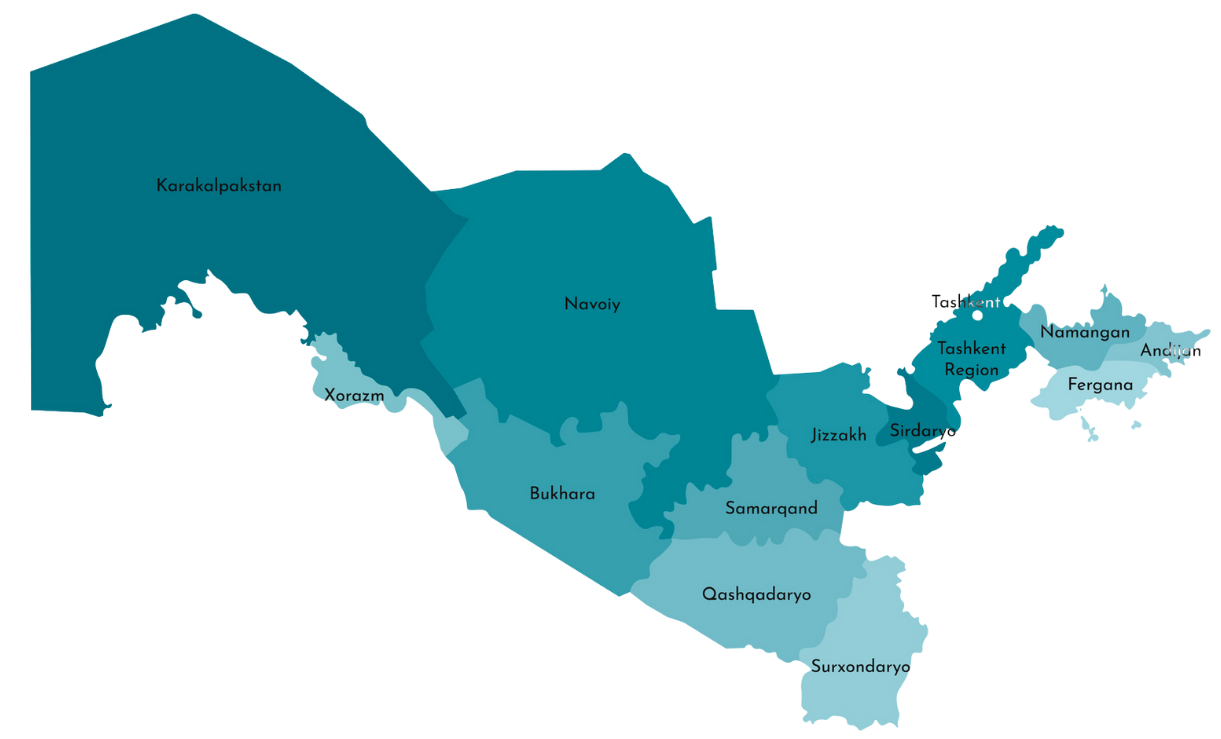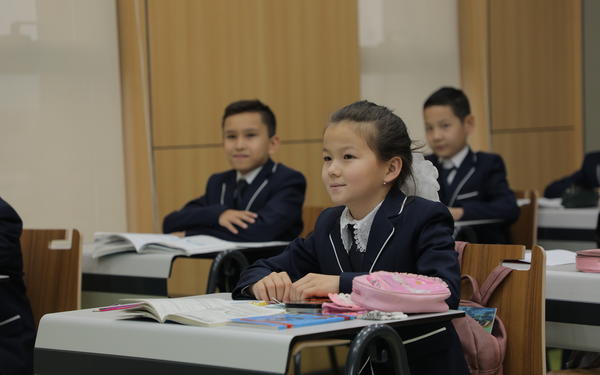The ‘limitless’ schools changing education in Uzbekistan
The Agency for Presidential Educational Institutions of the Republic of Uzbekistan (PIIMA) has established 14 Presidential Schools across Uzbekistan to provide young people with a world-class secondary education.
These Presidential Schools aim to “prepare the next generation of leaders to actively and positively contribute to the development of Uzbekistan”. PIIMA also hopes these institutions will offer opportunities to students from all backgrounds and impact the wider public education in Uzbekistan.
Cambridge has worked with PIIMA on admissions testing, the Cambridge curriculum for STEAM subjects, teacher professional development and school leadership development.

Education in Uzbekistan: a history
In 1420, the world’s largest Fakhri sextant was built outside Samarkand, modern-day Uzbekistan. Mathematician and astronomer Ulugh Beg used it to catalogue 1018 stars with celebrated accuracy. This research informed the work of academics for centuries to come, and you can still find an early edition of the catalogue in Oxford’s Bodleian Library.

Ulugh Beg was a Timurid sultan, leading a broad region stretching from modern-day Turkey to India. To promote learning and expertise across Central Asia, he developed the Uzbek cities of Samarkand and Bukhara into centres of mathematical and scientific excellence.
He constructed dedicated buildings for education, like the sextant, which sat on a hill rising 30m into the sky. These buildings stood tall – visible to all those travelling the popular Silk Road route across Asia.
Almost 600 years later, a new team is dedicated to improving learning in Uzbekistan through excellence in education.
PIIMA: the Agency for Presidential Educational Institutions of the Republic of Uzbekistan
Since 2016, there has been a concerted effort to establish an education system in Uzbekistan which equips the next generation with the skills and knowledge needed to play an active role in ‘New Uzbekistan’ – the nation’s vision for a brighter future.
As part of this work, the Agency for Presidential Educational Institutions of the Republic of Uzbekistan (PIIMA) was established by the Decree of the President of the Republic of Uzbekistan in September 2019.
The Presidential Schools programme
PIIMA has since established a series of 14 ‘Presidential Schools’ to combat some of the barriers to equitable and accessible education, and to give selected students in Uzbekistan access to an internationally-competitive education.
The PIIMA Presidential Schools programme aims to “support and encourage gifted youth” and produce an “intellectually-developed generation.”
The main priorities of Presidential Schools include:
- Selecting and educating gifted children, creating conditions for their full development
- Promoting in-depth study of sciences, foreign languages, engineering and information technologies
- Establishing modern methods of teaching and assessing students’ knowledge
- Developing students’ leadership, public speaking, critical thinking and analysis skills
- Ensuring student participation in international Olympiads and competitions
- Establishing cooperation with national and international education institutions
Presidential Schools: accessibility and admissions
Between 2019 and 2021, a Presidential School was built and opened in each of the 14 regions of Uzbekistan. The first four schools opened in the cities of Tashkent, Nukus, Namangan and Khiva in 2019. A further 10 schools opened from 2020 onwards, finishing with a school in the city of Gulistan in November 2021.

This spread encourages children from throughout the nation to apply to the schools. They are selected based on a competitive admissions test, which was designed by experts at Cambridge Assessment Admissions Testing.
The main selection test focuses on problem-solving and critical thinking, and it is offered in three languages – Uzbek, Karakalpak and English.
The Presidential School curriculum
The Presidential Schools educate students from 11 – 18 years old and provide free general secondary education and boarding.
Students study both the Cambridge curriculum and Uzbek national curriculum subjects. Many teachers at the schools come from abroad and have significant international education experience. They are paired with teachers from Uzbekistan.
Conditions are designed to encourage high-quality STEAM (Science, Technology, Engineering, Arts and Mathematics) studies, as well as nurture leadership and critical-thinking skills. They aim to prepare students to continue their education journey at international universities around the world.
PIIMA Presidential Schools: what do the students think?
When asked to sum up school in one word, during visits to Bukhara, Samarkand, Gulistan and Tashkent Presidential Schools in 2021, students were quick to share their excitement.
Rustam described it as “limitless”, Munisakhon said it was “fast-paced”, and for Madina, it’s a “dream”.
Malikabonu said it’s “the key that opens the door to my bright future”, while Maryam believes it’s“a path to my future career.”

Words used to sum up school by students at Presidential Schools in 2021
A typical day in a Presidential School
Compilation of descriptions from students in 2021

And the students’ favourite part of that day?
Rustam says it’s building his skills in Computer Science.
For Maryam, it’s the football and basketball pitches: “Most of my time I do my studies, but it doesn’t mean I don’t have time for sports! In the evenings, from 5 – 7, I play basketball, just to hang out after a hard day with my friends.” In Samarkand, Frisbee mania is sweeping through Grades 9 and 10.
In Tashkent, Shakrizoda sits down with her sewing machine to create innovative dresses which combine Uzbek national culture and traditional dress from around the world.

Sevara
Sevara’s favourite thing about school is “Laboratories…We do everything by practicing not writing. Almost every lesson we do something new to us…[My typical day now] is really different from what we did in the past. It’s enjoyable.”
Shohruh
“My favourite thing is teachers. International teachers come from different countries and are very inspiring. They don’t push us to learn things passively, they teach us how to use the things we learn.”
For all students, this daily routine is unlike life before the Presidential Schools were established by PIIMA.
Students like Madina previously studied in Russian and are new to English, as well as the Presidential School curriculum.
Others have studied in Uzbek for many years (and some, English), but have experienced a shift to student-centred learning and away from lecture models since joining a Presidential School.
Shakhboz
“My childhood dream is to meet Cristiano Ronaldo… but my main ambition is to become an ambassador and to represent Uzbekistan…I’m going to help to develop Uzbekistan and make Uzbek people’s life easier.”
The students have ambitions to attend international universities like MIT.
Madina wants to become a doctor and study abroad. Shohruh wants to “be an IT manager and create something new.”
Sevara says, “I want to be an economist, or an ambassador because well-educated economists can change society.”
Malikabonu
One of Malikabonu’s role models is her mother. “My mother raised me alone and I want to make her life better by having a well-paid job.” In fact, Malikabonu’s sights are set on an unprecedented achievement – “I want to be the first woman President of Uzbekistan.”
In 2021, the first cohort of students at the Presidential Schools sat Cambridge exams and applied to universities. 68% of the 96 students achieved A* to B in their Cambridge A levels, after just two years of studying a new curriculum in a new environment, for many in a new language, amid a pandemic. Of the 96 graduates, 88 were offered places at international universities.
These same students achieved leading places at International Olympiads in 2020.

Biybimaryam
Biybimaryam is halfway through her first year of studying medicine at Akfa University. Living in Uzbekistan’s capital city of Tashkent, she’s more than 1000km from her family home – a small village in the Karaozek district in Karakalpakstan.
This village is where Biybimaryam went to school before she was admitted to the Presidential School in Nukus in 2019. She had no English-language skills, but excelled in the Presidential School admissions tests, which can be sat in Uzbek and Karakalpak as well as English.
Two years later, Biybimaryam graduated with an IELTS Band 7 certificate, and an A* in Biology and A in Chemistry Cambridge A Levels – receiving invitations and scholarships to study abroad and enabling her to begin her journey to become a doctor.
Barno
Barno was one of the first students to attend the Presidential School in Khiva. In 2021, she graduated with three A*s in her Cambridge A Levels of Biology, Chemistry and Mathematics. Described by her teachers as an exceptionally hard worker, she also achieved an IELTS certificate at Band 8, first place in Chemistry, Biology and English at the Akfa University Olympiad and the “Yosh kitobxon” 2020 best reader prize. At the Presidential School, she also further developed her skills in music, especially piano, and dance.
Barno: “When we first came to the school all my classmates and I really struggled with the new curriculum, because the education system in the Presidential Schools is completely different to the education system in public schools in Uzbekistan. Apart from that, there were some difficulties, such as coronavirus pandemic, the lockdown, and distance learning. Despite all of that, we didn’t give up! We kept studying hard and working hard and finally we were able to accomplish Cambridge AS and A Levels.”
Abdulaziz
Abdulaziz creates websites in his spare time. Computer Science Olympiad-winning websites. One of the first graduates of the Presidential Schools, he also works hard in lessons – graduating with 1440 in the SATs, a Band 8 IELTS certificate, and A*s in Computer Science, Maths and Physics Cambridge A levels. His teachers describe someone who never gives up after failure, but learns and motivates himself to succeed.
Mukhammadali
Born in a small village in Namangan, eastern Uzbekistan, Mukhammadali is now studying business at the University of Arizona, USA.
He started his education journey in a small village public school, before being accepted to a specialised government boarding school where he excelled in mathematics and physics. When one of the first Presidential Schools opened in Namangan in 2019, Mukhammadali seized the opportunity to take his studies to a high level. In 2021, he graduated with an A* in Mathematics and Physics Cambridge A Levels and an El-Yurt Umidi scholarship from the British Council to continue studying abroad.
Frank Ford, Academic Director at the Bukhara Presidential School, says, “The school gives the students an enviable opportunity to do well anywhere in the world. I hope every child enjoys their experience…and take[s] advantage of the opportunities they have.”
English teacher Donnell hopes that “the students become global citizens…Education makes us better communicators, helps us transcend borders and get our ideas across.”
His colleague, Uzbek-born English-language specialist Sanjar, adds “Education is the biggest passport to the future.”
The impact of PIIMA’s Presidential Schools
The impact of the Presidential Schools is intended to extend beyond the lives of the children and young people accepted to the schools, of which there have been 1,344 students admitted from 110,591 applications since 2019. According to the Ministry of Education, more than 6.2 million students are taught by half a million teachers in more than 10,000 schools in Uzbekistan.
The PIIMA Presidential Schools programme hopes to inspire education ambition across the country, and to extend modern methods of teaching, learning and assessment to the wider public education system.
The number of candidates per place for the Presidential Schools admissions tests increased from 48 in 2019, the year the first four schools opened, to 64 in 2021, when a school was opening in every region.
The average score in the test increased from 47 in 2019 to 68.3 in 2021. Local teachers study English before teaching at a Presidential School, further embedding a wider focus among teachers in Uzbekistan on building English-language skills.
Girls’ education in Uzbekistan
PIIMA Director Hilola Umarova also announced her focus on women in STEM at the inaugural Uzbekistan International Education Forum in 2021.
At present, boys significantly outnumber girls in Uzbekistan’s Presidential Schools and, across the country, only 37% of students enrolled in university are women.
In Tashkent Presidential School, Shakrizoda represents the girls on the student council and focuses on ways to increase belonging and inclusivity for girls at the school.
Munisakohn
“My number one role model is my mom, but other than that it’s my peers, because I love to learn a lot from them and learn how they view the world…For me, education is important because it lets me see people’s viewpoints and understand their standpoints and broadens my horizons and that gives rise to me being more empathetic with other people... For the world, I want the same. I want people to be more empathetic and to understand other people more. Conflict rises from misinterpretation and miscommunication and I think the solution to that is mostly empathy.”
PIIMA Presidential Schools in Uzbekistan: summary
The establishment of Presidential Schools by PIIMA is part of a nationwide effort to provide high-quality, accessible education in Uzbekistan.
By opening a Presidential School in each of the country’s 14 regions, the programme aims to ensure that all young people have the opportunity to benefit from the improved education system in Uzbekistan, even those from remote or impoverished areas.
One of the primary goals of Uzbekistan’s Presidential Schools is to provide students with a world-class education on STEAM subjects, as well as important skills like critical thinking.
PIIMA’s programme also encourages young people to attend prestigious universities, both in Uzbekistan and abroad, which has proven to be a success based on the first graduating cohort in 2021.
Videos and photos by Bakhodirou Miryokub, courtesy of the Agency for Presidential Educational Institutions of the Republic of Uzbekistan (PIIMA). Data also courtesy of PIIMA.

